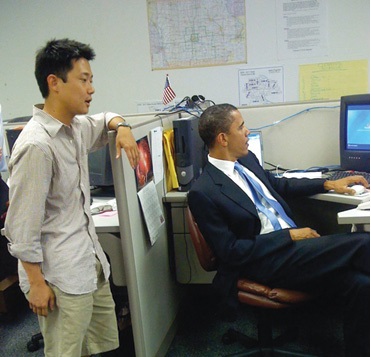by Suevon Lee
Photo courtesy of Ronnie Cho
It’s eight days before the Iowa caucuses, and dozens who’ve campaigned nonstop for long-shot candidate Barack Obama are gathered in a Des Moines office space on Christmas Eve. The group of campaign staffers and volunteers, most of whom look in their 20s, sit on desks, in front of laptops or huddled on the floor. The room is silent, as David Plouffe, Obama’s campaign manager, addresses the group via speaker phone.
He relays a recent conversation he’s had with his boss, in which the candidate had strongly expressed his desire to win this pivotal first contest. No kidding, Plouffe ribbed. No, Obama emphasized to him, “I really want to win Iowa … I wanna win for those kids.” There is a pause. “He believes so strongly in what you guys are doing,” says Plouffe, his words reverberating across the room.
The HBO documentary, By the People: The Election of Barack Obama, captures such moments leading up to the historic November 2008 election, which was as much a defining victory for millions of Americans as it was for the tens of thousands of young people who threw their support behind a young Illinois senator with a funny-sounding name. Within that groundswell of support was a then 24-year-old named Ronnie Cho, whose enthusiasm and dedication as a campaign staffer caught the attention of filmmakers Amy Rice and Alicia Sams during their making of the behind-the-scenes look into Obama’s journey to become the country’s first African American president.
The two-hour film, which premiered on HBO in November 2009 and was released to DVD January 12, is notable for its unprecedented access into Obama’s campaign. The Ed Norton-produced film intersperses on-the-trail campaign footage, shot over 18 months, with interviews with the candidate and those surrounding him, like chief strategist David Axelrod, Plouffe, speechwriter Jon Favreau, and members of the media.
But the camera also cuts regularly to on-the-ground campaign staffers like Cho, as he’s in his car driving to the next town, leading a spirited Obama cheer and dance, or initiating an early-morning phone tree in his boxers. His journey, both physical and emotional, in many ways embodies a movement that swept across the country more than a year ago.
“ ‘Just be yourself,’ ” Cho recalled the filmmakers telling him back in 2007. “I felt comfortable with that. We sort of built this rapport that ended up lasting for the next two years. I had really no concept until the film was finished that I was in it as much as I was.”
It was partly through timing and chance, and because of a life story that in ways mirrors the candidate’s own, that the directors honed in on Cho, who has since transitioned from the campaign trail to a post at the Federal Communications Commission.
“He was sort of living the Barack Obama dream—the son of immigrants, the first one to go to college. He represented a new generation of people,” Sams, 45, said.
“He was just so much fun to be with,” added Rice, 33, of Cho. “He symbolized the youth, which was a big part of the story, because from the beginning, we were told, ‘Obama’s never going to win, he has the B team, and all he has is the youth vote.’ ”
Obama’s electrifying speech at the 2004 Democratic National Convention as a then-U.S. Senate hopeful first moved Rice and Sams to capture the journey of a young and charismatic candidate. Cho was watching and listening, too. “I remember thinking to myself, ‘We’re really seeing something special,’ ” he said.
“I never really felt that way about any campaign or candidate before,” added Cho, who has worked on Al Gore and John Kerry’s presidential campaigns, as well as two Arizona gubernatorial campaigns for now-Homeland Security Secretary Janet Napolitano.
Not long after Obama announced his candidacy in February 2007, Cho left his job at the Department of Commerce in Arizona and jumped into one of the very first campaign staff roles in the Des Moines, Iowa, office. During audio commentary for the By the People DVD, the filmmakers, who met Cho early on during primary season, remarked that the campaigner, determined to embed himself in the community, even became a Little League coach while in Iowa.
Some of the film’s most powerful scenes are those which show Cho overcome with emotion during Obama’s victorious night in the Iowa caucuses, and again on Election Night, while on the phone with his exuberant mother.
These scenes also moved at least one other individual on the campaign trail. “President Obama, when he saw the movie, said, ‘I think the movie is really great. When Ronnie Cho cried and [Cho’s fellow staffer] Mike Blake cried, I cried,’ ” Rice recalled Obama saying. “ ‘I really think you guys should put more of them in it, less of me.’ ”
Cho grew up in Phoenix, where as an infant, home was once the backseat of his family’s car. His father, Alex Cho, was a racehorse jockey who moved to inner-city Los Angeles from Korea at a young age. Ronnie’s mother, Hee Cho, is an immigrant from Korea. During the early days, the family was on the road frequently, traveling for horse races, sometimes with no money to afford diapers for the infant Ronnie.
“That experience has shaped me throughout my life, to know how humble our beginnings were,” Cho said, adding it was his parents who stressed the importance of “caring about your community, caring about people who are less fortunate, and trying to create opportunities of fairness.”
At age 10, he volunteered for a local city council candidate’s campaign and still remembers the excitement and pride he felt after the election victory. The oldest of three, Cho studied political science at Arizona State University. He believes his parents’ enterprising outlook—they once ran a restaurant, and now buy and sell thoroughbred horses—has helped support his own daring, like dedicating a few years of his life to a political longshot’s campaign.
By the People follows Cho as he travels from Iowa to New Hampshire, then to Arizona, Texas and Indiana, and finally Maine, the state he was selected to lead as a field organizer.
“He learned a ton and got better at what he was doing,” noted Sams of Cho’s growth during the course of the campaign. “He went from being a young organizer to directing a team.”
Cho said he was forced to confront his own biases during those early primary months. He notes his preconceptions going to certain communities in Texas where there was not a single minority, but quickly felt those views dissipate. “These were the most gracious, open-minded people I’ve ever met,” he said.
But nothing quite compares to meeting the candidate himself. When he finally got Obama’s ear, the campaign staffer told him how much his run meant to him. “I remember him being very gracious, very sincere and appreciative,” Cho said.
Hee Cho, an engaged follower of politics, said she’s always shared her son’s enthusiasm for Obama, who reminded her of John F. Kennedy. “I was so mesmerized by his enthusiasm, his passion, and he was awfully smart,” she recalled thinking after his DNC keynote speech. “I told Ronnie, ‘Who is this guy? I don’t even know how to pronounce his name, but I love him.’ ”
Mrs. Cho would get to tell Obama that in person at the November 2007 Jefferson-Jackson dinner, where both she and Ronnie’s father met the candidate and his wife.
“ ‘I’m Mama Chobama, and here’s Papa Chobama,’ ” she recalled telling the couple. “[Senator Obama] was laughing so hard,” Mrs. Cho, who is in her late 40s, recounted. “He loved Ronnie. I even told Michelle, ‘I have to tell you that I’m in love with your husband.’ She said, ‘You’re not alone.’ ”
Ronnie’s role in the film has made him somewhat of a minor celebrity; it’s not unusual for him to be recognized by strangers in D.C. “This is a good way to be famous. I’m not a kid in a balloon,” he said with a laugh.
As a program analyst at the FCC, Cho is involved with such projects as the National Broadband Plan, an initiative formed under the American Recovery and Reinvestment Act of 2009 to bring high-speed broadband into households. He acknowledges that the transition to government work from the frenetic pace of election season has been a major adjustment, quoting former New York Governor Mario Cuomo’s now-famous line, “You campaign in poetry. You govern in prose.”
But Cho says he was committed to working in D.C. after the election “because we should put our money where our mouth is.”
“I want to be held accountable. I gave my best effort to help [Obama] do this,” he said. “I don’t aspire and dream to be a Washington bureaucrat, but now that I’m here, I’m happy to do it.”
Despite diminishing approval ratings for Obama over the past year, Cho rates the administration’s performance so far, “by any definition, a success.”
“It’s only been a year,” he added. “After the first quarter, you can’t judge the outcome of the entire game.”
As an Arizona native more accustomed to warm weather than Mid-Atlantic snowstorms, Cho doesn’t envision himself in Washington for two full terms, should Obama get reelected. Although a big dream of his is to turn his reliably red home state blue during the 2012 reelection season, he also acknowledges having personal political ambitions, like running for Congress.
“I feel I have something to contribute,” he said. “I have a desire to help people and I think you can never get enough good, smart people to help run the country. I feel strongly about that.”
Rice, for one, is convinced Cho has a bright political future ahead of him. “He’s got a whole team of people ready to work on his campaign, I tell you, the second he announces,” she said.
Cho said his experience working on the Obama campaign has galvanized his own future ambitions, and he’s grateful for the opportunity to have been a part of something so significant.
“I think [the election] really has paved the way for folks like me, for people who want to continue a career in government and politics,” he said. “Things are possible in ways that people haven’t really expected.”
And with those campaign memories still vivid in his mind, he’s now able to absorb what the experience has meant to him personally.
“Within one generation, coming from pretty dire straights, and now having a chance to work for a presidential candidate and working for the president’s administration…,” he reflects. “It’s kind of a great American story.”






